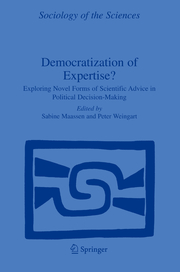Detailansicht
Democratization of Expertise?
Exploring Novel Forms of Scientific Advice in Political Decision-Making, Sociology of the Sciences Yearbook 24
ISBN/EAN: 9781402037535
Umbreit-Nr.: 1658017
Sprache:
Englisch
Umfang: viii, 238 S.
Format in cm:
Einband:
gebundenes Buch
Erschienen am 12.01.2006
Auflage: 1/2006
- Zusatztext
- InhaltsangabePreface vii Chapter 1: What's New in Scientific Advice to Politics? Introductory Essay 1 Sabine Maasen and Peter Weingart Chapter 2: Bioethical Controversies and Policy Advice: The Production of Ethical Expertise and its Role in the Substantiation of Political Decision-Making Alexander Bogner and Wolfgang Menz Chapter 3: Advisory Systems in Pluralistic Knowledge Societies: A CriteriaBased Typology to Assess and Optimize Environmental Policy Advice Harald Heinrichs Chapter 4: Institutional Design for Socially Robust Knowledge: The National Toxicology Program's Report on Carcinogens David H. Guston Chapter 5: Representation, Expertise, and the German Parliament: A Comparison of Three Advisory Institutions Mark B. Brown, Justus Lentsch and Peter Weingart Chapter 6: Expertise and Political Responsibility: The Columbia Shuttle Catastrophe Stephen Turner Chapter 7: Knowledge and Decision-Making Frank Nullmeier Chapter 8: Science/Policy Boundaries: A Changing Division of Labour in Dutch Expert Policy Advice Willem Halffman and Rob Hoppe Chapter 9: Inserting the Public Into Science Heather Douglas Chapter 10: Between Policy and Politics Or: Whatever Do Weapons of Mass Destruction Have to Do With GM Crops? The UK's GM Nation Public Debate as an Example of Participatory Governance Simon Joss Chapter 11: Participation as Knowledge Production and the Limits of Democracy Matthijs Hisschemöller Chapter 12: Judgment Under Siege: The Three-Body Problem of Expert Legitimacy Sheila Jasanoff List of Authors Biographical Notes Author Index
- Kurztext
- 'Scientific advice to politics', the 'nature of expertise', and the 'relation between experts, policymakers, and the public' are variations of a topic that currently attracts the attention of social scientists, philosophers of science as well as practitioners in the public sphere and the media. This renewed interest in a persistent theme is initiated by the call for a democratization of expertise that has become the order of the day in the legitimation of research funding. The new significance of 'participation' and 'accountability' has motivated scholars to take a new look at the science - politics interface and to probe questions such as "What is new in the arrangement of scientific expertise and political decision-making?", "How can reliable knowledge be made useful for politics and society at large, and how can epistemically and ethically sound decisions be achieved without losing democratic legitimacy?", "How can the objective of democratization of expertise be achieved without compromising the quality and reliability of knowledge?" Scientific knowledge and the 'experts' that represent it no longer command the unquestioned authority and public trust that was once bestowed upon them, and yet, policy makers are more dependent on them than ever before. This collection of essays explores the relations between science and politics with the instruments of social studies of science, thereby providing new insights into their re-alignment under a new régime of governance.
